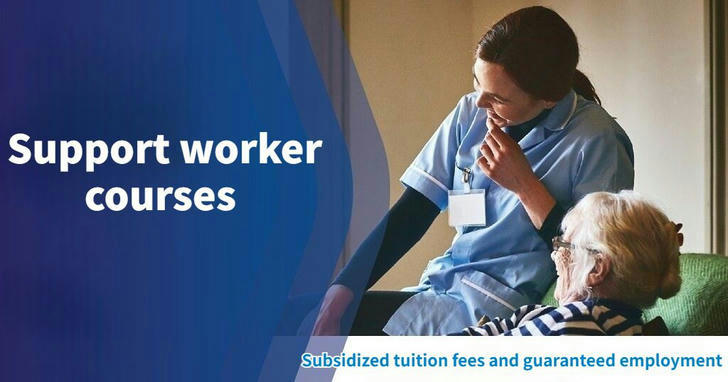️💼Australian Disability Support Worker Course {Scholarship} 👷♂
With an increasing number of individuals requiring professional care in Australia, the demand for qualified disability support workers has surged. To address this need, government agencies, TAFE (Technical and Further Education) institutions, and private training providers now offer specialized programs to equip aspiring professionals with nationally recognized qualifications 💼. These courses combine paid training opportunities 💼, financial subsidies 💰, and post-completion employment guarantees ✅, ensuring participants gain both skills and career advancement support.

Core Qualifications for Disability Support Roles
The foundation of Australia’s disability support workforce lies in nationally accredited certificates, such as the Certificate III in Individual Support (Disability) 🌟. These credentials are mandatory for roles involving direct care or community engagement, ensuring graduates meet industry competency and ethical standards.
Key Training Pathways
Government-Funded Programs 🏛️
JobTrainer Initiative: Subsidized training for high-demand sectors, including disability care. Eligibility often depends on age or employment status, making it accessible for career changers.
NDIS-Aligned Training: Online platforms like NDIS Online Training provide competency-based modules covering complex care, mental health, and workplace safety, ensuring alignment with national guidelines.
Salary Subsidies: Programs like the Specialist Disability Employment Program (SDEP) offer wage subsidies of up to $10,000 AUD to employers hiring staff with disabilities.
TAFE Institutions 🎓
TAFE colleges nationwide offer courses like CHC33021 Certificate III in Individual Support (Disability). Key features include:
Comprehensive Curriculum: Training in person-centered care, communication, and disability assistance.
Flexible learning: Accelerated options (2-4 weeks) and scholarships are available for disadvantaged students.
Paid Internships: Earn while learning, with direct employer payments and leave entitlements. 💼 (2-4 weeks)
Private Registered Training Organizations (RTOs) 🔄
Private RTOs provide hybrid (online + practical) training for certifications like Certificate III in Individual Support. Financial aid is available for eligible students to offset costs.
Community Organizations 🤝
Local groups offer tailored programs combining online learning and hands-on experience, ensuring equitable access to education across diverse demographics.
Application Requirements 📋
Age: Minimum 18 years (varies by provider).
Education: No formal ATAR required, but healthcare/community service experience is prioritized.
Mandatory Checks: Blue Card, NDIS Worker Screening, First Aid certification, and police clearance. ✅
Skills: Empathy, adaptability, and person-centered care capabilities are critical. ❤️
Application Process 📝
Research Providers: Platforms like SEEK or Open Universities Australia list accredited courses and internships.
Submit Documentation: Resume, proof of qualifications, and identification.
Interview/Assessment: Skills-based evaluations by employers.
Enroll: Formal registration via online portals or direct institution contact.
Example: Claro’s community roles or Yooralla’s Youth Transition Program.
Employment Opportunities Across Age Groups 👴👵👶
Youth (18–24)
Programs like First Base foster independence through skill-building activities for individuals with intellectual disabilities.
Adults (25–54)
High-demand roles include Personal Care Assistant, Community Support Worker, and Case Manager. Flexible shifts are common. 💪
Mature Workers (55+)
Initiatives like Mature Age Hubs connect retirees with organizations needing crisis management expertise.
FAQs ❓
Q1: Are certificates valid nationally?
Yes, nationally recognized certificates (e.g., Cert III) enable cross-state employment.
Q2: Average Salary?
The average annual salary is $73,103 AUD 💰, varying by experience and location.
Q3: Can part-time roles transition to full-time?
Yes, many employers use temporary roles as pathways to permanent positions for reliable candidates.
Q4: Does employment include support services?
Employers typically offer mentorship, paid training, and Employee Assistance Programs (EAPs). 🌟
Conclusion 🌟
Australia’s disability support workforce offers nationally accredited qualifications 📄, government-backed subsidies 💰, and strong employment prospects 📈. Whether you are a young professional, mid-career transitioner, or retiree seeking purpose, these programs provide a gateway to a rewarding career while making a meaningful impact on vulnerable communities.
Key Takeaways
Certifications: Mandatory for roles like Certificate III in Individual Support ✅.
Financial Support: Scholarships, subsidies, and paid internships reduce financial barriers. 💼
Job Security: High demand ensures stable employment post-qualification.
By pursuing these pathways, you can join a dynamic industry that prioritizes both personal growth and societal contribution. 🤝💖
